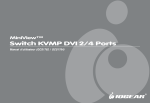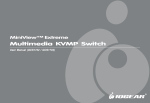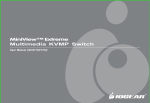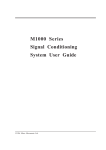Download iogear GCS1644
Transcript
Installation Guide 2/4-Port Dual View Dual Link DVI KVMP Switch with Audio 1 GCS1642/GCS1644 PART NO. M1087 / M1088 2 ©2009 IOGEAR. All Rights Reserved. PKG-M1087 / M1088 IOGEAR, the IOGEAR logo, MiniView®, VSE are trademarks or registered trademarks of IOGEAR, Inc. Microsoft and Windows are registered trademarks of Microsoft Corporation. IBM is a registered trademark of International Business Machines, Inc. Macintosh, G3/G4 and iMac are registered trademarks of Apple Computer, Inc. IOGEAR makes no warranty of any kind with regards to the information presented in this document. All information furnished here is for informational purposes only and is subject to change without notice. IOGEAR, Inc. assumes no responsibility for any inaccuracies or errors that may appear in this document. 3 Package Contents –– –– –– –– –– –– –– –– 1 x 2/4-Port Dual View Dual Link DVI KVMP Switch with Audio 2/4 x Dual Link DVI KVM Cables (2 for GCS1642 / 4 for GCS1644) 2/4 x Dual Link DVI Cables (2 for GCS1642 / 4 for GCS1644) 1 x USB to PS/2 Converter 1 x Firmware Upgrade Cable 1 x Power Adapter 1 x Installation Guide 1 x Warranty Card 4 System Requirements Console –– Two displays with DVI inputs –– A Keyboard and Mouse Computer –– Computers with DVI outputs –– An open USB port Optional Audio –– Analog audio connections for speakers and mic. 5 Table of Contents GCS1642 Overview 7 Mac Keyboard Emulation 24 GCS1644 Overview 9 Sun Keyboard Emulation 25 Installation 12 Factory Default Hotkey Settings 26 LED Indication 17 Firmware Upgrade 27 Port Switching via Front Panel Pushbutton 18 Upgrade Fail 32 FCC Statement 34 Port Switching via Hotkeys 19 Auto Scanning 21 Hotkey Setting Mode (HSM) 22 6 CE Statement 36 Limited Warranty 37 Contact 38 GCS1642 Overview Front View 1. Port 1 Pushbutton 4. Front Panel Console Mic. Connection 2. Mode Button 5. Front Panel Console Audio connection 3. Port 2 Pushbutton 6. Front Panel USB 2.0 Peripheral Sharing Port Dual Link Dual View DVI KVMP SWITCH GCS1642 2 1 7 3 4 5 6 Rear View 1. 2. 3. 4. 5. 6. Firmware Upgrade Port DC Power Jack Console USB Mouse Port Console USB Keyboard Port Console DVI Video Port B Console DVI Video Port A 1 2 3 4 5 6 7. USB 2.0 Peripheral Sharing Port 8. Console Mic. Connection 9. Console Audio Connection 10. CPU2 DVI Video Port 2B 11. CPU2 DVI Video Port 2A 12. CPU2 USB Connection 7 8 11 12 13 14 15 9 10 8 13. CPU2 Mic. Connection 14. CPU2 Audio Connection 15. CPU1 DVI Video Port 1B 16. CPU1 DVI Video Port 1A 17. CPU1 USB Connection 18. CPU1 Mic. Connection 19. CPU1 Audio Connection 16 17 18 19 GCS1644 Overview Front View 1. 2. 3. 4. 5. 6. 7. 8. Port 1 Pushbutton Port 2 Pushbutton Mode Button Port 3 Pushbutton Port 4 Pushbutton Front Panel Console Mic. Connection Front Panel Console Audio connection Front Panel USB 2.0 Peripheral Sharing Port Dual Link Dual View DVI KVMP SWITCH GCS1644 1 2 3 9 4 5 6 7 8 Rear View 16. CPU3 DVI Video Port 3A 17. CPU3 USB Connection 18. CPU3 Mic. Connection 19. CPU3 Audio Connection 20. CPU2 DVI Video Port 2B 21. CPU2 DVI Video Port 2A 22. CPU2 USB Connection 23. CPU2 Mic. Connection 24. CPU2 Audio Connection 25. CPU1 DVI Video Port 1B 26. CPU1 DVI Video Port 1A 27. CPU1 USB Connection 28. CPU1 Mic. Connection 29. CPU1 Audio Connection 1. Firmware Upgrade Port 2. DC Power Jack 3. Console USB Mouse Port 4. Console USB Keyboard Port 5. Console DVI Video Port B 6. Console DVI Video Port A 7. USB 2.0 Peripheral Sharing Port 8. Console Mic. Connection 9. Console Audio Connection 10. CPU4 DVI Video Port 4B 11. CPU4 DVI Video Port 4A 12. CPU4 USB Connection 13. CPU4 Mic. Connection 14. CPU4 Audio Connection 15. CPU3 DVI Video Port 3B 10 3 1 2 5 4 6 10 8 7 9 15 16 13 11 20 21 18 23 17 12 11 28 24 19 14 25 26 22 29 27 Installation Step 1 Please make sure your source devices and display are powered off before you start. Step 2 Plug the power adapter into the power outlet and connect it to the DC power jack from the KVM. 12 Step 3 Connect the DVI cables from your monitors to the console DVI port A and B. Port A will be your main monitor and Port B will be your extended desktop monitor. 13 Step 4 Connect your USB keyboard and mouse to the console USB keyboard port and console USB mouse port. Note: If you are using PS/2 keyboard and mouse, please use the included PS/2 to USB converter. Simply connect the PS/2 keyboard and mouse to the PS/2 keyboard and mouse port from the converter, then connect the USB port to the console USB keyboard port. 14 Step 5 Connect a set of your Dual Link DVI KVM cable from the KVM switch to each of your computers – DVI connection from DVI Port A to the DVI output and USB connection to open USB port from your computer. Connect the audio and mic. connectors to your audio output and mic. input. 15 Step 6 Connect Dual Link DVI cables from DVI Port B of the KVM to your second DVI output of your computers. Final Step Turn on your source devices. 16 LED Indication LED Description Mode Orange Shows the pushbutton mode that the KVM is in Online / Selected Dim Green A device is connected to the KVMP switch but the port is not on focus Bright Green The specific port has focus on the KVM (Keyboard, video and mouse) Audio Green The specific port has focus on the audio USB Link Green The specific port has focus on the USB peripheral sharing ports 17 Port Switching Simply press the front panel Pushbutton from the multimedia KVMP switch or trigger hotkeys from your keyboard. Port Switching via Front Panel Pushbutton Function Description Switch all focus (KVM, audio and USB) to a specific port Press the correspond push button once for the desire port that you wish to switch focus to. Switch KVM focus to a specific port Press the Mode button once (Orange LED will show you are in KVM Mode), then press the correspond push button for the desire port that you wish to switch focus to. Switch audio focus to a specific port Press the Mode button twice (Orange LED will show you are in Audio Mode), then press the correspond push button for the desire port that you wish to switch focus to. Switch USB focus to a specific port Press the Mode button three times (Orange LED will show you are in USB Mode), then press the correspond push button for the desire port that you wish to switch focus to. 18 Port Switching via Hotkeys Port Switching via Hotkeys Hotkeys Description [Scroll Lock] [Scroll Lock] [Enter] Switch all focus (KVM, audio and USB) to the next port [Scroll Lock] [Scroll Lock] [n] [Enter] Switch all focus (KVM, audio and USB) to port n* [Scroll Lock] [Scroll Lock] [k] [Enter] Switch KVM focus to the next port [Scroll Lock] [Scroll Lock] [n] [k] [Enter] Switch KVM focus to port n* [Scroll Lock] [Scroll Lock] [s] [Enter] Switch audio focus to the next port [Scroll Lock] [Scroll Lock] [n] [s] [Enter] Switch audio focus to port n* [Scroll Lock] [Scroll Lock] [u] [Enter] Switch USB focus to the next port [Scroll Lock] [Scroll Lock] [n] [u] [Enter] Switch USB focus to port n* Continue next page 19 Port Switching via Hotkeys [Scroll Lock] [Scroll Lock] [n] [k] [u] [Enter] Switch KVM and USB focus to port n* [Scroll Lock] [Scroll Lock] [n] [k] [s] [Enter] Switch KVM and audio focus to port n* [Scroll Lock] [Scroll Lock] [n] [u] [s] [Enter] Switch USB and audio focus to port n* *Note: n is an interval that stands for the Port number k stands for KVM focus s stands for audio focus u stands for USB focus 20 Auto Scanning You can either activate Autoscan Mode via front panel push button or hotkeys. Function Description Front panel pushbutton Auto Scan Hotkeys Press and hold port 1 and port 2 Pushbutton simultaneously for 2 seconds to activate Autoscan Mode* [Scroll Lock] [Scroll Lock] [a] [Enter] Activate Autoscan mode. It will cycle from port to port every 5 seconds (default) [Scroll Lock] [Scroll Lock] [a] [n] [Enter] Activate Autoscan mode. It will cycle from port to port every n seconds** *Note: Autoscan Mode from front panel push button will be scanning a port every 5 seconds by default. If you wish to have the Autoscan Mode be scanning with different time interval, please refer to trigger Autoscan Mode from hotkeys. **Note: n is an interval between 1 and 99 that stands for the time (in second) desire for scanning each port. 21 Hotkey Setting Mode (HSM) Hotkey Description 1. Press and hold [Num Lock] ([Clear] key on Mac keyboard) 2. Press and release [-] 3. Release [Num Lock] ([Clear] key on Mac keyboard) Invoking hotkey setting mode Invoke HSM, then press [h] Change the HSM invocation keys from [Num Lock] to [Ctrl] and from [-] to [F12] Invoke HSM, then press [t] Switch port switching hotkey sequence between [Scroll Lock] [Scroll Lock] and [Ctrl] [Ctrl] Invoke HSM, then press [F2] Enables Mac keyboard emulation Invoke HSM, then press [F3] Enables Sun keyboard emulation Invoke HSM, then press [F10] Auto-detect the keyboard operating platform (for PC compatible systems). Activates Pass Through Keyboard Mode (keystrokes are sent directly to the computer instead of through the Mac emulator). 22 Invoke HSM, then press [F4] List hotkey settings – simply invoke the hotkey and then open a text editor, such as notepad, and use the Paste function to display the hotkey settings. Invoke HSM, then press [F5] USB Reset Invoke HSM, then press [b] Toggle hotkey beepers on or off Invoke HSM, then press [x] [Enter] Disable or enable port switching hotkey Invoke HSM, then press [u] [p] [g] [r] [a] [d] [e] [Enter] Activate Firmware Upgrade Mode – Front panel KVM LED will flash indicating Firmware Upgrade Mode is activated. Invoke HSM, then press [r] [Enter] Restore default settings Invoke HSM, then press [d] Capture and store video information on specific port Invoke HSM, then press [m] Enable or disable mouse emulation Invoke HSM, then press [F1] Reset keyboard and mouse under some special OS’ that do not support USB 2.0 *Note: To exit HSM manually, press Esc or spacebar 23 Mac Keyboard Emulation The PC compatible (101/104 key) keyboard can emulate the functions of the Mac keyboard. The emulation mappings are listed in the table below. PC Keyboard Mac Keyboard PC Keyboard Mac Keyboard [Shift] Shift [Print Screen] F13 [Crtl] Ctrl [Scroll Lock] F14 = [Ctrl] [1] [Enter] Return [Ctrl] [2] [Backspace] Delete [Ctrl] [3] [Insert] Help [Ctrl] [4] [Ctrl] F15 [Alt] Alt *Note: When using key combinations, press and release the first key (Ctrl), then press and release the second key. 24 Sun Keyboard Emulation The PC compatible (101/104 key) keyboard can emulate the functions of the Sun keyboard. The emulation mappings are listed in the table below PC Keyboard Sun Keyboard PC Keyboard Sun Keyboard [Crtl] [t] Stop [Crtl] [F10] Cut [Crtl] [F2] Again [Crtl] [1] [Crtl] [F3] Props [Crtl] [2] [Crtl] [F4] Undo [Crtl] [3] [Crtl] [F5] Front [Crtl] [4] [Crtl] [F6] Copy [Crtl] [h] [Crtl] [F7] Open [Crtl] [F8] Paste [Ctrl] [F9] Find Help Compose *Note: When using key combinations, press and release the first key (Ctrl), then press and release the second key. 25 Factory Default Hotkeys Settings Function Default Port Switching [Scroll Lock] [Scroll Lock] Invoking HSM [Num Lock] [-] Auto Scan Interval 5 Seconds Beeper On Keyboard Operating Platform PC Compatible Port Switching Keys Enabled Mouse Emulation On 26 Firmware Upgrade Note: In order to perform a firmware upgrade, you need to use a computer that’s not connected to the KVM. Step 1 Connect the provided firmware upgrade cable to the firmware upgrade port of the KVM and the serial port of your computer. Connect power adapter to your power outlet and the KVM. Step 2 Go to www.iogear.com to download the latest available firmware or the specific firmware that you wish to upgrade to. Step 3 Shut down all the computers that are connected to the KVM. Then Invoke Firmware Upgrade Mode. (Please refer to Hotkeys Setting Mode section.) Step 4 Extract the file with WinRAR or compatible software. Then double click on the execute file to begin with the Firmware Upgrade Utility. 27 Step 5 Read the License Agreement and click “I Agree” then click “Next” if you wish to continue with the firmware upgrade. Otherwise, click “Cancel” to exit. 28 Step 6 Choose the correct KVM that you wish to perform firmware upgrade from the “Device List” and then click “Next” to continue. Then the Firmware Upgrade Utility will verify if there is a KVM connected to the computer by the firmware upgrade cable. (Check Firmware Version checkbox is optional) 29 Step 7 If you have checked the “Check Firmware Version” checkbox, then the utility will check the current firmware that is on your KVM. If the current firmware is newer than the firmware that you wish to upgrade to, a window will popup and prompt you to ask if you wish to proceed. Simply click “Yes” to start the upgrade and “No” to cancel the upgrade. Note: If you did not check the “Check Firmware Version” checkbox, utility will perform the upgrade automatically no matter what version of firmware you have in the KVM. 30 Step 8 When the firmware upgrade is done, you will see “Firmware upgrade OK” in the “Status Messages” window. Then simply click “Finish” to complete the whole firmware upgrade process. Final Step Now the KVM will reset by itself and it will be ready for usage after the rest. 31 Upgrade Fail If you don’t see “Firmware upgrade OK” in the “Status Messages” window, it means the utility has failed to complete the firmware successfully. If that occurs, please do the following: Step 1 Unplug the DC connector from the KVM, then remove the housing of the KVM. Step 2 Using a jumper cap, short the jumper on the main board labeled J40 (for GCS1642) / J45 (for GCS1644). GCS1642 Step 3 Now plug the DC connector back into the DC jack from the KVM. This will restore the KVM with factory default firmware. GCS1644 32 Step 4 Perform the firmware upgrade again. Step 5 When the firmware upgrade is completed, unplug the DC connector from the KVM. Then remove the jumper from J40 (for GCS1642) / J45 (for GCS1644) and put the housing back together. Final Step Plug DC connector back into the KVM, then the KVM will be ready for usage again. 33 Federal Communications Commission (FCC) Statement 15.21 You are cautioned that changes or modifications not expressly approved by the part responsible for compliance could void the user’s authority to operate the equipment. 15.105(b) his equipment has been tested and found to comply with the limits for a Class B digital device, pursuant to part 15 of the FCC rules. These limits are designed to provide reasonable protection against harmful interference in a residential installation. This equipment generates, uses and can radiate radio frequency energy and, if not installed and used in accordance with the instructions, may cause harmful interference to radio communications. However, there is no guarantee that interference will not occur in a particular installation. If this equipment does cause harmful interference to radio or television reception, which can be determined by turning the equipment off and on, the user is encouraged to try to correct the interference by one or more of the following measures: - Reorient or relocate the receiving antenna. - Increase the separation between the equipment and receiver. - Connect the equipment into an outlet on a circuit different from that to which the receiver is connected. - Consult the dealer or an experienced radio/TV technician for help. 34 THIS DEVICE COMPLIES WITH PART 15 OF THE FCC RULES. OPERATION IS SUBJECT TO THE FOLLOWING TWO CONDITIONS: 1. this device may not cause interference and 2. this device must accept any interference, including interference that may cause undesired operation of the device. FCC RF Radiation Exposure Statement: This equipment complies with FCC radiation exposure limits set forth for an uncontrolled environment. End users must follow the specific operating instructions for satisfying RF exposure compliance. This transmitter must not be co-located or operating in conjunction with any other antenna or transmitter. 35 CE Statement This device has been tested and found to comply with the requirements set up in the council directive on the approximation of the law of member states relating to EMC Directive 89/336/EEC, Low Voltage Directive 73/23/EEC and R&TTE Directive 99/5/EC. The product has been approved for LVD and covered the following countries: Belgium, Denmark, France, Germany, Italy, Portugal, U.K., Spain, Sweden 36 Limited Warranty IN NO EVENT SHALL THE DIRECT VENDOR’S LIABILITY FOR DIRECT, INDIRECT, SPECIAL, INCIDENTAL OR CONSEQUENTIAL DAMAGES RESULTING FROM THE USE OF THE PRODUCT, DISK, OR ITS DOCUMENTATION EXCEED THE PRICE PAID FOR THE PRODUCT. The direct vendor makes no warranty or representation, expressed, implied, or statutory with respect to the contents or use of this documentation, and especially disclaims its quality, performance, merchantability, or fitness for any particular purpose.The direct vendor also reserves the right to revise or update the device or documentation without obligation to notify any individual or entity of such revisions, or updates. For further inquiries please contact IOGEAR. 37 Contact IOGEAR 23 Hubble Irvine, CA 92618 P 949.453.8782 F 949.453.8785 Visit us at: www.iogear.com 38 39 About Us FUN IOGEAR offers connectivity solutions that are innovative, fun, and stylish, helping people enjoy daily life using our high technology products. GREEN IOGEAR is an environmentally conscious company that emphasizes the importance of conserving natural resources. The use of our technology solutions helps reduce electronic waste. HEALTH IOGEAR supports healthy and fit lifestyles. By integrating products with the latest scientific developments, IOGEAR’s solutions enhance the life of end-users. 40 © 2009 IOGEAR®



















































